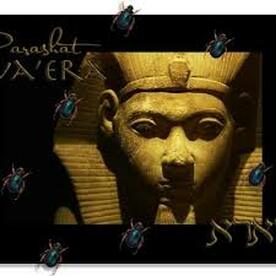
Go to Pharaoh in the morning when he goes out to the water. Stand on the riverbank to confront him, take in your hand the staff which was turned into a snake,
(Exo 7:15 CJB)
A WORD FROM A MARRIAGE COUNSELOR
One day I was listening to a radio program where a lady broadcaster gave marriage advice to callers. A woman called complaining about the controlling behavior of her husband. To the surprise of the caller, the counselor said, "Your husband must be a miserable man; you need to feel sorry for him!" The caller who probably was trying to get some sympathy asked what the counselor meant and here was the reply she received. "Controlling people are controlling are very fearful. They fear for their standing; they fear for their appearances; they fear the opinions of man; they fear failure. This makes them want to have everything under their control, which puts them under constant pressure and makes their lives miserable."
Pharaoh was such a fearful man. Claiming to be God, he was fearful of anything that would challenge his claim, especially people like Moshe.
PHARAOH'S PSYCHOLOGICAL EVALUATION
The text of the parasha this week tells us of Pharaoh going out to the river (Gen 7:15). Why was he going to the river? Couldn't he take a bath at home? Because he claimed to be God, Pharaoh pretended not to be like everybody else having to comply with some of these encumbering and humiliating bodily functions. Therefore, medieval times Torah commentator Rashi says that Pharaoh used to go to the River each morning in order to relieve himself.
One can imagine the suffering of this poor man. This is the cost of recognition-seeking, the cost of indulging ourselves in the adulation of man. We have to "play the game" so to speak. In order to indulge in his extreme need for control, the control of a monarch with absolute power whose slightest word could bring death to an insubordinate subject, Pharaoh he had to suffer living a life of pretense. He couldn't even relieve himself during the day. And what did he get for it? What did it give him? Just a little more honor than others, and that at a very costly price.
THE DECEIT OF PRETENSE.
It reminds of the movie, "The Final Cut." The movie is placed in the future when people would have the option of receiving an eye implant that records every moment of their lives. When they die, someone takes the "film" and edit it for their memorial service. At that time, their story is in the hand of the "editor." The movie goes on to tell of one girl who lived her life like any other person until she learned that when she was 18, unbeknownst to her, she received an implant. It is at that time that she became religious. That time of her life was very short. She couldn't take the pressure of being "good" all the time so she killed herself.
Seeking recognition, honor, or authority through pretense causes suffering, and people afflicted with such a desire should be pitied.
***********
THE RIGHT ATTITUDE TOWARD SUFFERING
Pharaoh was a pitiful man whose life hinged on his ability to control everything. This caused him intense suffering but Pharaoh responded to suffering. Here is what happened when he was under pressure,
Pharaoh summoned Moshe and Aharon and said to them, "This time I have sinned: Adonai is in the right; I and my people are in the wrong." (Exo 9:27 CJB)
But as soon as it was over, he went back to his old ways, (just like most of us).
When Pharaoh saw that the rain, hail and thunder had ended, he sinned still more by making himself hardhearted, he and his servants. (Exo 9:34 CJB)
Why did he do that? Why do we do that?
It is because of a wrong attitude towards suffering. Pharaoh saw suffering as a punishment. Sometimes just like Pharaoh, we also look at suffering as a punishment instead of what it really is: a tool for growth and self-improvement.
Suffering is actually a personal message from HaShem that He is working on some improvement in our lives. When we see suffering as a tool of growth, we find meaning in our suffering.
Here are Paul's admonitions on the subject. Paul knew about suffering. To suffer for the Name of Yeshua was in life's mission as prophesied to him by Ananias (Acts 9:15-16).
Let us also boast in our troubles; because we know that trouble produces endurance, endurance produces character, and character produces hope; and this hope does not let us down, because God's love for us has already been poured out in our hearts through the Ruach HaKodesh who has been given to us.
(Rom 5:3-5 CJB)
James, the brother of the Master who martyred in the Temple precinct also knew about suffering.
Regard it all as joy, my brothers, when you face various kinds of temptations; for you know that the testing of your trust produces perseverance. But let perseverance do its complete work; so that you may be complete and whole, lacking in nothing.
(Jas 1:2-4 CJB)
As an example of suffering mistreatment and being patient, brothers, take the prophets who spoke in the name of Adonai. Look, we regard those who persevered as blessed. You have heard of the perseverance of Iyov, and you know what the purpose of Adonai was, that Adonai is very compassionate and merciful.
(Jas 5:10-11 CJB)
 RSS Feed
RSS Feed